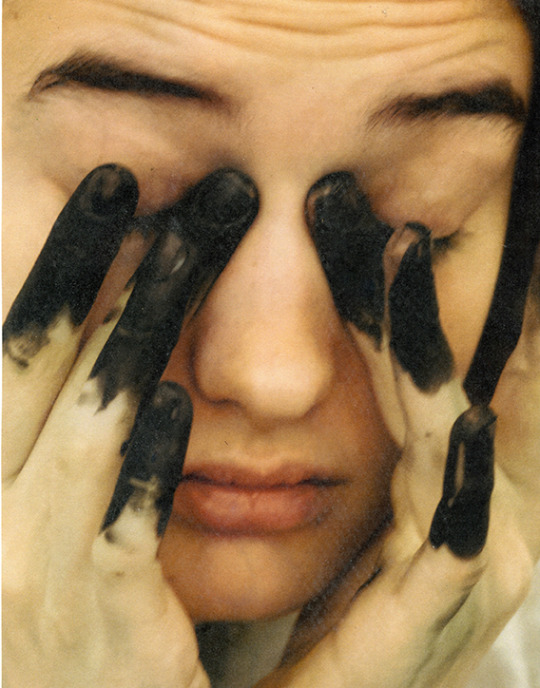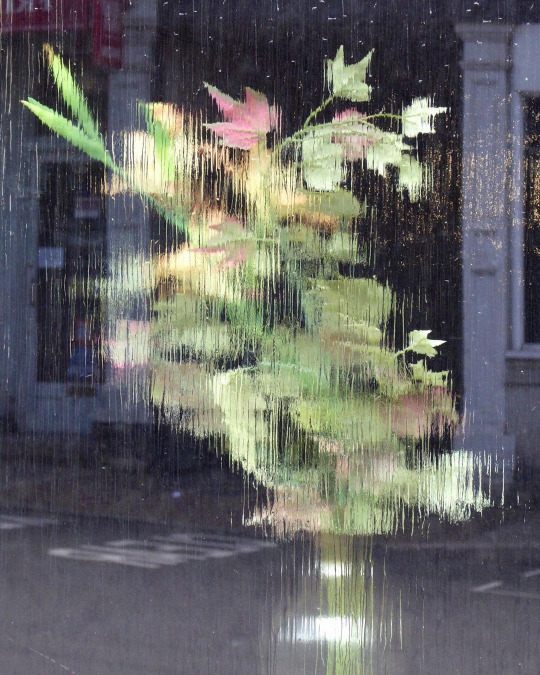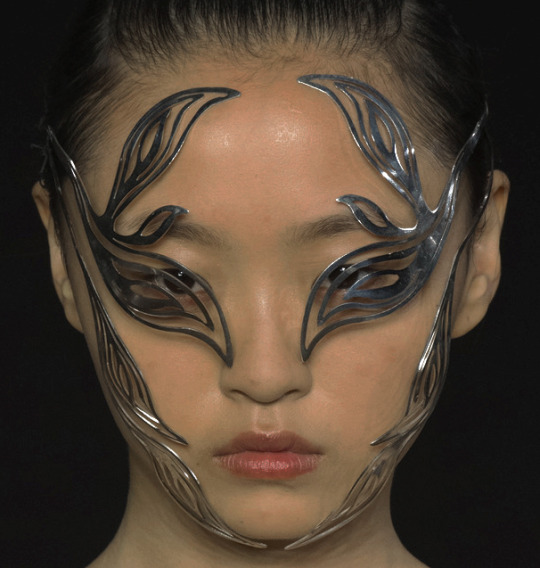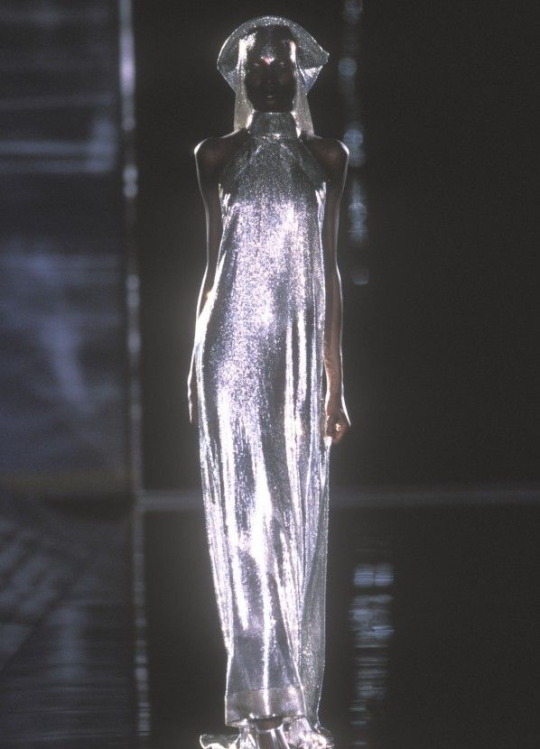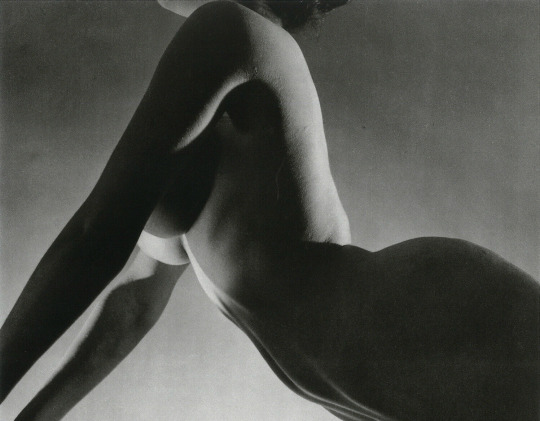Photo


interiors in Genova, Italy, February 2018 instagram.com/ariannaferretti
72K notes
·
View notes
Photo

Che Lovelace, Tree with fruit, assorted pigment on board, 2016
407 notes
·
View notes
Text
Jeremy Dixon’s ‘In Retail’ (2019)
(Disclosure: I don’t know Jeremy very well, but I met/saw him a couple months back when we performed at an online festival, Stay at Home Fest. Butcher’s Dog Magazine had an open mic where they invited writers from previous issues of the mag to come and perform stuff they’d had published with them, and outside of that. Since then, I’ve been reading and offering reviews to people from that evening, so I’m kicking off with In Retail. In Retail is published by Arachne Press, I don’t personally know anyone from there, it’s the first time I’ve heard of them. They’re dedicated to publishing titles from LGBTQIA+ writers, Jeremy Dixon himself identifies as queer, and they’re an environmentally conscious publisher, which I think is admirable. I don’t know many publishers who have an eco statement, as Arachne Press does here.)
In Retail is an incredibly observant collection, and I feel it’s for that reason, it is so moving and relevant, really. The collection is written from Jeremy’s experiences working in a well-known chain of chemists, spending life on the other side of the till. And I think when you get into a job within hospitality, there is a perceived monotony which comes from the client’s point of view, that on we go and the cashier remains stood, serving the next person and waving goodbye. In Retail disproves these gross suppositions. From the moment it begins, there is a deep looking, there is humour, there is trauma. Our interactions are held and studied amidst transaction. The reality could not be more crippling, nor more awkward, or ecstatic in some places. Consumer culture is embedded into the very form of the writing itself. Every page of this collection, quite appropriately, reads like a shop receipt, and small events, repeated phrases and nods become products of each day that the ‘I’ here, takes home with them. We scan our way down each poem, every one of which are headed ‘IN RETAIL’ and footed by different, often repeated, end-notes. These parts are greyed out which gives them a carbon-copy feel, and it’s quite intentional, as Jeremy originally wrote these poems on the back of till-roll paper. Even the typography, the titles themselves are consistent with the font you might find on till receipts, and are numbered like so “00/01″. Transaction of the day.
I think this collection is for anyone who calls themselves a people-watcher. I think it is for anyone who observes other people as part of a living. I am reminded of that line from Nessa in Gavin & Stacey: ‘I see every thread of life’s rich tapestry in between these three walls. The whole spectrum of human emotion.’ In Retail is a gallery of these experiences, the human vernacular, familiar and terrifying, the assortment of mannerisms and quips stood between Jamie Oliver and Lipsy. More pertinently, it’s an education in how to hold back the things you want to say.
The first poem immediately sets a precedent, ‘00/01′:

Already there’s a feeling of intimidation, a tentative look into the night-shift. But the speaker seems so used to it, the poem merely invites the potentially problematic sequence of difficulties, in ‘Come methadone paper / wavers, talking backwards [...] Come red raw builders buying aerosol plasters’. It seems fearless actually, and I think this preface of ‘With the night come’ ascertains that there is nothing irregular about this, that it’s a case of dealing with the last of the rabble before shutting doors. Inconvenient yes, tiresome yes, but completely usual. Until:

We are on the countdown to finish, for some people, this is the longest and sometimes most excruciating part of the shift. It is quickly clipped by a sinister threat: ‘She leans close / to whisper: I can get you cut. And it’s quite paralysing, as if I too inhabit this space between them as a reader, surveying the threat. There’s no further description, except we are left with the tail end of the receipt, speaking backwards: ‘THANK YOU FOR YOUR CUSTOM’. You have to wonder, how many times do we express gratitude for abuse, in the name of professionalism? How many times do we fear on our way out of work, someone will avenge us for doing our job? And there’s something about how, besides imitating the aesthetic of a receipt, how these greyed-out end-notes feel like cloudy afterthoughts from the muddied product of experience here.
‘00/03′ is driven by repeated utterances, as the stanzas are dragged out further, tragedy thickens. Humour is softly churned into despair. The day begins with the echo of the cashier’s mantra:
Good morning.
Do you have an Advantage Card?
And would you like a bag?
Please enter your PIN.
An address all too well recognised. Polite, measured, sedate. It continues:
Good morning.
Thank you for waiting.
Do you have an Advantage Card?
And would you like a bag?
Please enter your PIN.
Good morning.
Thank you for waiting.
No one’s answering the bell.
Do you have an Advantage Card?
And would you like a bag?
Please enter your PIN.
[...]
Morning.
Thank you for waiting.
No one’s answering the bell.
They’re all at a party without me.
Seems I’m the only one left in the ship.
I could find myself with a riot on my hands.
Yes, you’re right it isn’t good enough is it.
Did you have an Advantage Card?
And would you like a bag?
Please enter your PIN.
Mourning.
Thank you for belling.
No one’s answering the weight.
And there’s another party without me.
Seems I’m the only one left in the world.
I could find myself with blood on my hands.
Yes you’re right it isn’t God enough is it.
Mother says contactless is Satan’s kiss.
Have you taken the advantage?
And do you need a nosebag?
Please enter your PAIN.
That line in the final stanza is incredible. ‘Mother says contactless is Satan’s kiss’. Payment is a glide of the hand, quick, dismissive, a kiss that never touches the glass. Thoughtlessness cushions temptation. As the stanzas stretch with each additional line, the regular address hailed to customers is muddled with the internal thought processes and feelings of the ‘I’. The transaction is deflected away from the customer, and instead, the receipt becomes a kind of monologue for the ways in which the shop is in debt to the cashier’s slog. Plays on words reinforce the ‘I’s’ unfound respite, a “good morning” turned ‘Morning’ before being reduced to a state of ‘Mourning’. Something particularly painful in this poem is that the customer is never failed to be greeted, as the ‘I’ staggers under the weight of other miseries, and gestures of kindness often go ignored. It seems that, unlike the flurry of clients, the feelings of the cashier are hardly ever addressed.
Jeremy quite often sheds light on the inequities the colleagues face within the workplace throughout the collection, also the changeability of management’s welfare towards staff. This is evident in ‘00/07′:
Seems we all get headaches.
There used to be a staff
stash of paracetamol
kept behind Pharmacy
but now you have to buy
your own.
We hear it a lot, don’t we? “Once upon a time you used to get that for free”, “Once upon a time you could bring in your mate for that and nobody would bat an eyelid”, “I’d lose my job now if I did that”. It’s symptomatic of how kindness now, comes at a price. As business progresses, profit turns a profit on its staff. Why vouch for their welfare when you can turn them into a customer?
And in ‘00/14′:
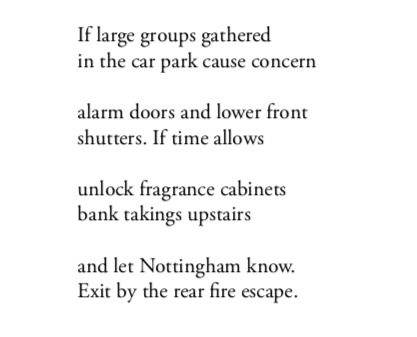
As the collection continues, it becomes clear colleagues are encouraged to fend for interests which do not secure them, where management is distinguished as a separate entity, and the question of a company’s morals are measured based on how much stock is left rather than quizzing how a staff of people really feel. It seems that they are aligned very much in the same ways in which perfume giftsets and creams are humped across shelves gathering dust, as it is in ‘00/08′:
the Late team is working extra duty
sales-planning Christmas in mid-September
obeyed lasered maps of where to stack
Lipsy and Jamie Oliver
the shelves are filthy
far too low for packs to stand
I find that phrase ‘extra duty’ so profound here. While ‘duty’ alone feels like a commendation of a word, ‘extra’ has consumerist connotations which commodify and capitalise on what it means to take ‘duty’. And it’s as though the tendrils of capitalist vernacular are constantly squeezing out the moral value of its workers, “far too low” to really “stand”. I also remark on this poem for the internal segregation between colleagues, the awkwardness of age difference separates their sense of humour:
Upside down plays on the radio
and I attempt an electric slide
but they’re too young to appreciate an 80s move
There’s a clear distinction between management and the shop floor but Jeremy does not attack it per se, rather it’s the observational quality to the writing which leaves us to make our own assumptions based around what is being seen and heard. I think of how staff are set together like the stock, together, regimental, before being dispersed by the chaos of Christmas shopping prep. Jeremy reinforces these distinctions between team members by sectioning the collection into three, the first being {STAFFED}, the second {MANAGED} and the third, {CONSUMED}. The final section seems to embrace the two as incubators of consumerism, that together they oversee it.
In Retail is grounded in more broader political contexts which compounds the politics of the high-street chemist. In ‘00/26′:
today the queue is strung with angry people
angry that we are leaving
angry that people are angry that are leaving
angry that people are still talking about leaving
[...]
angry at Labour
angry at Plaid
angry at their parents
angry at the Papers
angry at the Pound
angry that all the Star Gifts sold out before they arrived
Anger here compounds the atmosphere of the shop floor. It also feels like a currency in a way, in which people have been mis-sold an idea. In this case, I assume it to be Brexit. Plaid (Plaid Cymru, a Welsh political party), parents, products of a misleading mess funnel down into papers and Star Gifts, and anger reduces in its worth as it is dismissively directed into all things. Serious issues don’t matter if you can’t buy what you want. I note that Jeremy again, never openly takes a side per se, but rather the writing here becomes a neutral ground on which things happen to the voice, and it is left to us as readers to make assertions.
And part of the frustration and the humour in a collection like In Retail is that voice becomes a collective of common phrases and repeated mannerisms, bits of eavesdropping and stacked quotes from customers which saddle the experience of working the tills. I think of ‘00/29′: ‘A man buys a pint of milk / And I’m not buying anything else, / because I’ve been so bad lately. / Really bad.’ and in ‘00/34′, I initially hear a consistent whinging of a child asking for stuff (though that’s not ascertained exactly who is speaking here), ‘please can I have an iphone X / please can I have an Xbox ONe / please can I have Hexbugs / please can I have Hot Wheels’ before the voice turns stranger: ‘[...] / please can I have a black wollit / please can I have how / please can I have Portmeirion’ and the requests become duller, more abstract, more absurd because this collective of voices consistently gabbing for things they want, soon becomes a collective voice of not really knowing what it wants, at all.
In Retail is as much funny as it is sinister. It’s an objective look at people, and I sometimes think that its observant nature is sustained by a certain professionalism, that holding back, that inability to pass judgement as an employee, that ‘customer is always right’ mentality, where the subject’s inner turmoil seldomly slips, because it isn’t really allowed to. And when it does, it’s within a cacophony of maddening queries, the tannoy blaring customer announcements, the baskets of unnoticed returns which will still be there tomorrow. In Retail leaves a lot to reflect on, because it is so relevant to us, still, and given the time in which some of the poems were composed back in 2017, it’s clear that not much has changed. Its wit and composition is to be admired, particularly for its literal-ness, the act of turning a book into a series of a receipts is of course, a wonderful irony for anyone purchasing it from a different shop. It is cheeky and mournful, but perhaps more pertinently, it encapsulates all the dimensions of the human condition within a public space at a distance so well-executed that it feels alien to read.
Of course, if this review’s won you over, you can purchase In Retail right here. You can also follow Jeremy over on Twitter too and find out a little bit more about him over on Arachne Press’s site.
#review#bookreview#poetry#collection#visualpoetry#welshwriting#queerpoetry#inretail#arachnepress#debut#ukpoetry#writing
0 notes


